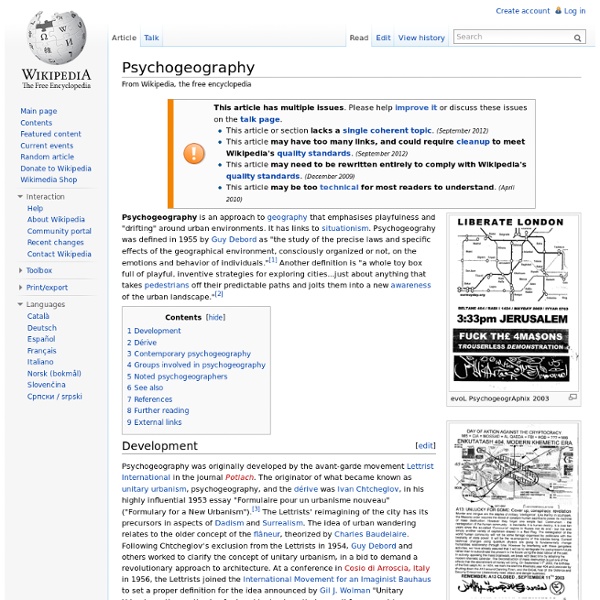Psychogeorgraphy is...
Flâneur
Paul Gavarni, Le Flâneur, 1842. Flâneur (pronounced: [flɑnœʁ]), from the French noun flâneur, means "stroller", "lounger", "saunterer", or "loafer". Flânerie refers to the act of strolling, with all of its accompanying associations. The flâneur was, first of all, a literary type from 19th century France, essential to any picture of the streets of Paris. Etymology[edit] Charles Baudelaire The terms of flânerie date to the 16th or 17th century, denoting strolling, idling, often with the connotation of wasting time. The flâneur was defined in a long article in Larousse’s Grand dictionnaire universel du XIXe siècle (in the 8th volume, from 1872). By then, the term had already developed a rich set of associations. In the 1860s, in the midst of the rebuilding of Paris under Napoleon III and the Baron Haussmann, Charles Baudelaire presented a memorable portrait of the flâneur as the artist-poet of the modern metropolis: The crowd is his element, as the air is that of birds and water of fishes.
definition
Translating the Untranslatable
London Psychogeographical Association
logo of the East London Section of the London Psychogeographical Association London Psychogeographical Institute[edit] The LPA was first mentioned in 1957 by the British artist Ralph Rumney, as one of the organisers of the "First Exhibition of Psychogeography" in Brussels, which included his work.[2] According to many accounts the group (which was also referred to as the London Psychogeographical Institute or Society) eventually merged into the Situationist International.[3] LPA East London Section[edit] This version of the LPA has been described by the writer Iain Sinclair, whose work is often described as psychogeographical, as useful in "branding" that kind of practice.[4][dead link][5][dead link] In 1994 Barry Hugill wrote an article for The Observer covering the LPA. The last LPA Newsletter was issued around the year 2000. See also[edit] References[edit] External links[edit]
10 Untranslatable Words (And When You'll Want to Use Them)
English is one of the harder languages to learn, especially if you consider certain key aspects of it. One is pronunciation and spelling, whereas in languages like Spanish, Italian, Latin, Greek, and German the words are pronounced exactly or almost exactly as to what they are spelled, in English this is not as common of an occurrence, or at least spelling/pronunciation continuity is not as intuitive as it could be. Consider the letter sequence "ough," it is pronounced as "off" in cough, as "uf" in rough and tough, as "uu" in through, as "ahh" in thought, and as "oh" in thorough, however some people will pronounce thorough with an "uh" sound for the "ough" in the word.
The Workshop for Non-Linear Architecture
The Workshop for Non-Linear Architecture (WNLA) was the name taken by a group of experimental artists and psychogeographers active in Britain (sections existed in both Glasgow and London) during the 1990s. Informed to a large degree by the urban practices of the Paris based Lettriste Internationale (1952–57), the workshop focused its practise on developing the lettrist theory of Unitary Urbanism through physical research and behavioural intervention; redefining the psychogeographical terrain of the cityscape in relation to its emotive resistivity. During the two year 'Psychogeographical Survey of Glasgow' (1992–94) the group concentrated its activity on refining the interplay between the Letterist (and later situationist) techniques of derive and constructed situation. While the Workshop For A Non-Linear Architecture has received little press this is due to the WNLA's indifference towards media coverage rather than a matter of policy. Notes and references[edit] Bibliography[edit]
20 more awesomely untranslatable words from around the world
If only you could use these words in Scrabble. Photo: Jeremy Mates When linguists refer to “untranslatable” words, the idea is not that a word cannot somehow be explained in another language, but that part of the essence of the word is lost as it crosses from one language to another. This often is due to different social and cultural contexts that have shaped how the word is used. In the novel Shame, Salman Rushdie’s narrator suggests: “To unlock a society, look at its untranslatable words.” Here are 20 words that don’t translate directly into English; what may these words tell us about the societies in which they come from? 1. Arabic – [in-shal-la] While it can be translated literally as “if Allah wills,” the meaning of this phrase differs depending on the speaker’s tone of voice. It can be a genuine sentiment, such as when talking to an old friend and parting with “We’ll meet again, inshallah,” or it can be used as a way to tacitly imply you actually aren’t planning to do something. 2.



